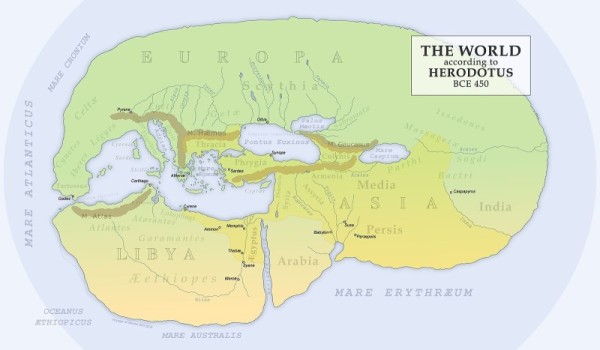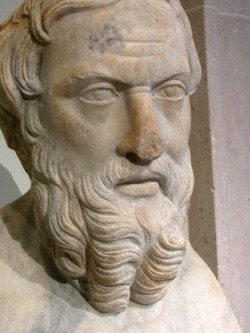So when they understood one another, the men spoke to the Amazons as follows . . . .

Translated by George C. Macaulay — our special project presenting the complete Herodotus with URLs for all of those people, places, events, and things which baffles and discourages modern readers.
Previously on Herodotus
110. About the Sauromatai the following tale is told: -— When the Hellenes had fought with the Amazons, now the Amazons are called by the Scythians “Oiorpata”, which name means in the Hellenic tongue “slayers of men”, for “man” they call “oior”, and “pata” means “to slay”, -— then, as the story goes, the Hellenes, having conquered them in the battle at the Thermodon, were sailing away and conveying with them in three ships as many Amazons as they were able to take prisoners. These in the open sea set upon the men and cast them out of the ships; but they knew nothing about ships, nor how to use rudders or sails or oars, and after they had cast out the men they were driven about by wave and wind and came to that part of the Maiotian lake where Cremnoi stands; now Cremnoi is in the land of the free Scythians. There the Amazons disembarked from their ships and made their way into the country, and having met first with a troop of horses feeding they seized them, and mounted upon these they plundered the property of the Scythians.
111. The Scythians meanwhile were not able to understand the matter, for they did not know either their speech or their dress or the race to which they belonged, but were in wonder as to whence they had come and thought that they were men, of an age corresponding to their appearance: and finally they fought a battle against them, and after the battle the Scythians got possession of the bodies of the dead, and thus they discovered that they were women. They took counsel therefore and resolved by no means to go on trying to kill them, but to send against them the youngest men from among themselves, making conjecture of the number so as to send just as many men as there were women. These were told to encamp near them, and do whatsoever they should do; if however the women should come after them, they were not to fight but to retire before them, and when the women stopped, they were to approach near and encamp. This plan was adopted by the Scythians because they desired to have children born from them.
112. The young men accordingly were sent out and did that which had been commanded them: and when the Amazons perceived that they had not come to do them any harm, they let them alone; and the two camps approached nearer to one another every day: and the young men, like the Amazons, had nothing except their arms and their horses, and got their living, as the Amazons did, by hunting and by taking booty.

CC BY-SA 2.0 image from Wikipedia.
113. Now the Amazons at midday used to scatter abroad either one by one or by two together, dispersing to a distance from one another to ease themselves; and the Scythians also having perceived this did the same thing: and one of the Scythians came near to one of those Amazons who were apart by themselves, and she did not repulse him but allowed him to lie with her: and she could not speak to him, for they did not understand one another’s speech, but she made signs to him with her hand to come on the following day to the same place and to bring another with him, signifying to him that there should be two of them, and that she would bring another with her. The young man therefore, when he returned, reported this to the others; and on the next day he came himself to the place and also brought another, and he found the Amazon awaiting him with another in her company. Then hearing this the rest of the young men also in their turn tamed for themselves the remainder of the Amazons;
114, and after this they joined their camps and lived together, each man having for his wife her with whom he had had dealings at first; and the men were not able to learn the speech of the women, but the women came to comprehend that of the men. So when they understood one another, the men spoke to the Amazons as follows:
We have parents and we have possessions; now therefore let us no longer lead a life of this kind, but let us go away to the main body of our people and dwell with them; and we will have you for wives and no others.
They however spoke thus in reply:
We should not be able to live with your women, for we and they have not the same customs. We shoot with bows and hurl javelins and ride horses, but the works of women we never learnt; whereas your women do none of these things which we said, but stay in the wagons and work at the works of women, neither going out to the chase nor any whither else. We therefore should not be able to live in agreement with them: but if ye desire to keep us for your wives and to be thought honest men, go to your parents and obtain from them your share of the goods, and then let us go and dwell by ourselves.
115. The young men agreed and did this; and when they had obtained the share of the goods which belonged to them and had returned back to the Amazons, the women spoke to them as follows:
We are possessed by fear and trembling to think that we must dwell in this place, having not only separated you from your fathers, but also done great damage to your land. Since then ye think it right to have us as your wives, do this together with us,—come and let us remove from this land and pass over the river Tanaïs and there dwell.
– Herodotus, Book IV
| <—Previous | Master List | Next—> |
Herodotus made his living by being interesting. In a world where most people did not read and could not afford to buy a book even if they could, they would pay to listen to Herodotus recite from his books. They would not pay to be bored. In that world, the names that populate his stories would have some general familiarity to his audience. Their obscurity to us is a barrier that this series seeks to break down.
MORE INFORMATION
MAP LIBRARY
Because of lack of detail in maps as embedded images, we are providing links instead, enabling readers to view them full screen.

Leave a Reply
You must be logged in to post a comment.